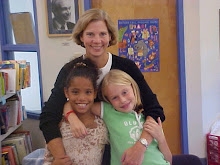Student-led conferences will be rolling around in a couple of weeks, and the preparation has already begun. Students of all ages will choose pieces of work that show their strengths - and pieces that illustrate areas where they need to grow. They answer questions designed to foster self-analysis, "What do I do well - and which piece of work shows it?"and "What steps do I need to take to improve?" They practice the presentations well before conference day.
Students gain a feeling of responsibility for their own learning and success - a key skill for life. Practice with self-reflection gives them confidence and self-knowledge. From a parent's perspective, the typical question, "How's my kid doing?" segues into realization that their child is able to look deeply and set real goals.
In the Mindshift article Why Students Should Take the Lead in Parent-Teacher Conferences, the authors say, "Over time the parents begin to set a higher bar for their children at these conferences."
Walking around and observing the family groupings at student-led conferences is one of my favorite things at school. The conversations are revealing and often touching. The child holds his or her parents' undivided attention and feels their respect and pride. They both glow. So do the teachers.




